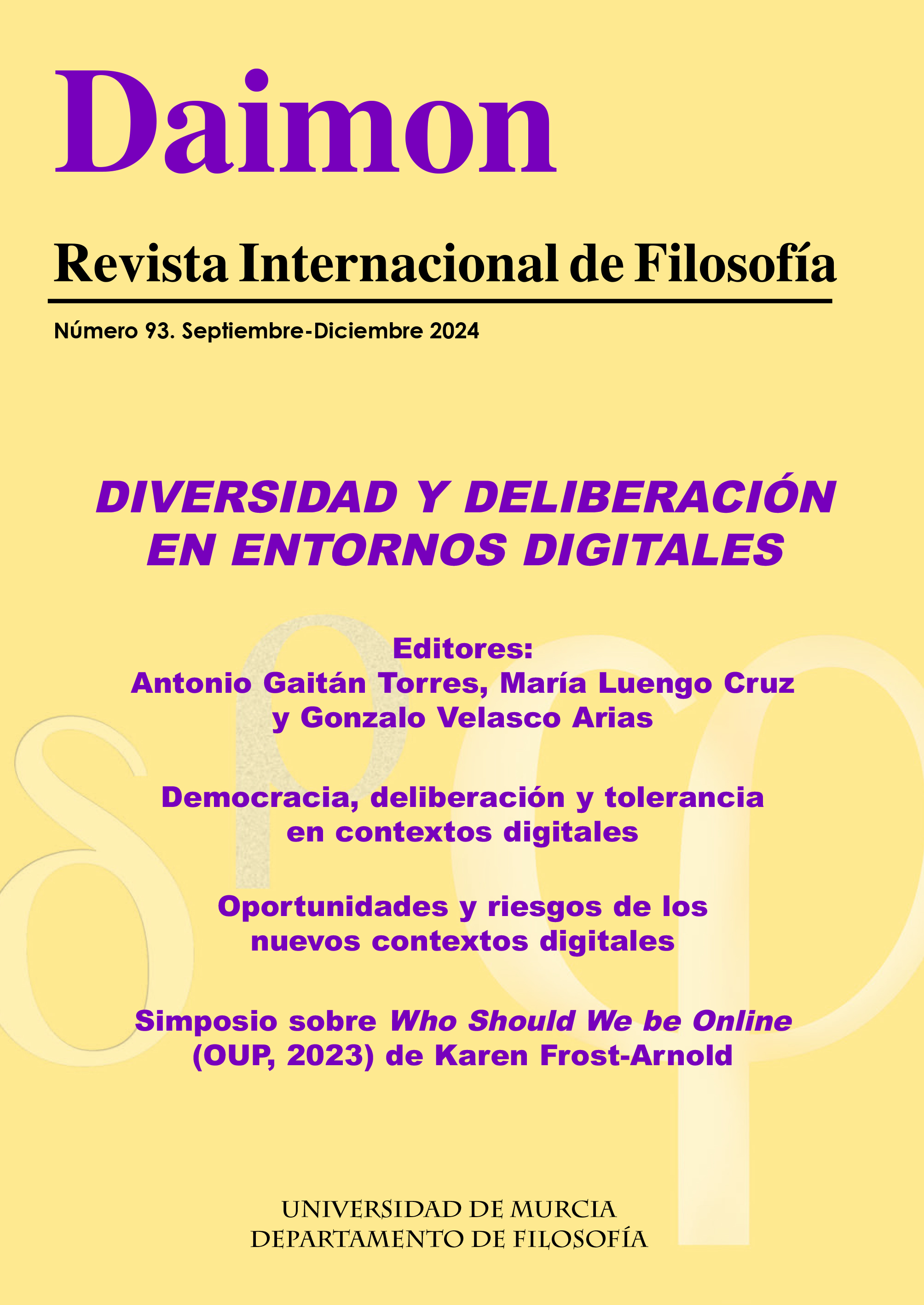Uncommon ground and plurality of speech acts in online polylogues
Abstract
How to understand the complexity of argumentative online interactions when there is a diversity of points of view that do not interact according to normativity patterns? Given the need to research how collectives deliberate and argue in online interactions and taking the idea of uncommon ground as a starting point, here I will try to demonstrate the presence of a plurality of speech acts that, together with multiple participants and multiple locations, constitute the multiple positions in online polylogues, more precisely those that take place on X (formerly Twitter).
Downloads
-
Abstract429
-
PDF (Español (España))170
-
HTML (Español (España))22
References
Aakhus, M., & Lewiński, M. (2017). Advancing Polylogical Analysis of Large-Scale Argumentation: Disagreement Management in the Fracking Controversy. Argumentation, 31(1), 179-207.
Abbott, B. (2006, octubre). Unaccommodating presuppositions: A neoGricean view. On presupposition accommodation, Michigan State University. https://semantics.uchicago.edu/kennedy/classes/f09/semprag1/unaccompresupps.pdf
Arielli, E. (2018). Sharing as speech act. Versus, 127, 243-258.
Borg, E., & Connolly, P. J. (2022). Exploring Linguistic Liability. En E. Lepore & D. Sosa (Eds.), Oxford Studies in Philosophy of Language Volume 2. Oxford University Press.
Bruxelles, S., & Kerbrat-Orecchioni, C. (2004). Coalitions in Polylogues. Journal of Pragmatics, 36(1), 75-113.
Camp, E. (2017). Pragmatic Force in Semantic Context. Philosophical Studies, 174(6), 1617-1627.
Corredor, C. (2020). Speaking, Inferring, Arguing. On the Argumentative Character of Speech. Studia Semiotyczne, 34(2), 43-64.
Greco, S. (2023). Twitter Activists’ Argumentation Through Subdiscussions: Theory, Method and Illustration of the Controversy Surrounding Sustainable Fashion. Argumentation, 37(1), 1-23.
Grice, H. P. (1957). Meaning. Philosophical Review, 66(3), 377-388.
Innocenti, B. (2022). Demanding a halt to metadiscussions. Argumentation, 36(3), 345-364.
Kauffeld, F. J., & Jean, G. (2022). Two views of speech acts: Analysis and implications for argumentation theory. Languages, 7(2), 93. https://doi.org/10.3390/languages7020093
Kerbrat-Orecchioni, C. (2004). Introducing Polylogue. Journal of Pragmatics, 36(1), 1-24. https://doi.org/10.1016/S0378-2166(03)00034-1
Lewinski, M. (2021). Speech Act Pluralism in Argumentative Polylogues. Informal Logic, 42(4), 421-451.
Lewiński, M., & Aakhus, M. (2014). Argumentative Polylogues in a Dialectical Framework: A Methodological Inquiry. Argumentation, 28(2), 161-185.
Lewiński, M., & Aakhus, M. (2023). Argumentation in Complex Communication: Managing Disagreement in a Polylogue. Cambridge University Press.
Lewiński, M., Cepollaro, B., Oswald, S., & Witek, M. (2023). Norms of Public Argument: A Speech Act Perspective. Topoi, 42(2), 349-356.
Macagno, F., & Capone, A. (2016). Uncommon ground. Intercultural Pragmatics, 2(13), 151-180.
Marcoccia, M. (2004). On-line polylogues: Conversation structure and participation framework in Internet Newsgroups. Journal of Pragmatics, 36(1), 115-145. https://doi.org/10.1016/S0378-2166(03)00038-9.
Marsili, N. (2021). Lies, Common Ground and Performative Utterances. Erkenntnis, 88(2), 567-578.
Meijers, A. (2007). Collective Speech Acts. En Intentional Acts and Institutional Facts (Vol. 41, pp. 93-110). Springer, Dordrecht.
Musi, E., & Aakhus, M. (2018). Discovering Argumentative Patterns in Energy Polylogues: A Macroscope for Argument Mining. Argumentation, 32(3), 397-430.
Palmieri, R., & Mazzali-Lurati, S. (2016). Multiple Audiences as Text Stakeholders: A Conceptual Framework for Analyzing Complex Rhetorical Situations. Argumentation, 30(4), 467-499.
Stalnaker, R. (2002). Common ground. Linguistics and Philosophy, 25(5-6), 701-721.
Copyright (c) 2024 Daimon Revista Internacional de Filosofia

This work is licensed under a Creative Commons Attribution-NonCommercial-NoDerivatives 3.0 Unported License.
Las obras que se publican en esta revista están sujetas a los siguientes términos:
1. El Servicio de Publicaciones de la Universidad de Murcia (la editorial) conserva los derechos patrimoniales (copyright) de las obras publicadas, y favorece y permite la reutilización de las mismas bajo la licencia de uso indicada en el punto 2.
2. Las obras se publican en la edición electrónica de la revista bajo una licencia Creative Commons Reconocimiento-NoComercial-SinObraDerivada 3.0 España (texto legal). Se pueden copiar, usar, difundir, transmitir y exponer públicamente, siempre que: i) se cite la autoría y la fuente original de su publicación (revista, editorial y URL de la obra); ii) no se usen para fines comerciales; iii) si remezcla, transforma o crea a partir del material, no podrá distribuir el material modificado.
3. Condiciones de auto-archivo. Se permite y se anima a los autores a difundir electrónicamente las versiones pre-print (versión antes de ser evaluada) y/o post-print (versión evaluada y aceptada para su publicación) de sus obras antes de su publicación, ya que favorece su circulación y difusión más temprana y con ello un posible aumento en su citación y alcance entre la comunidad académica. Color RoMEO: verde.











